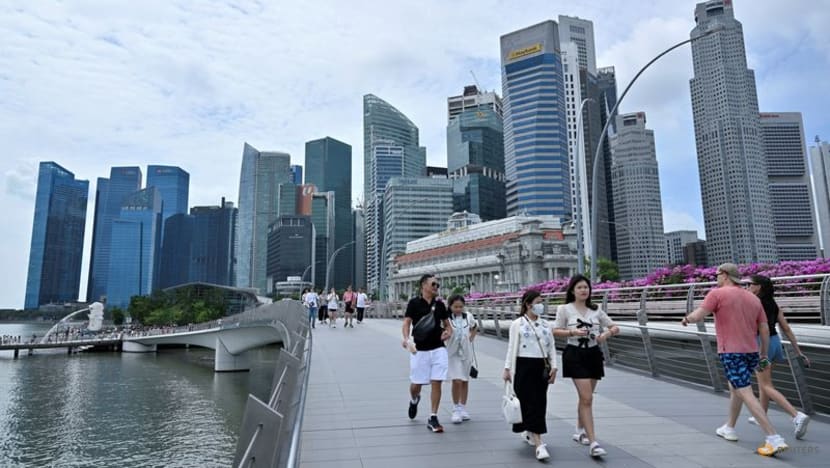Rise in anti-Singapore sentiment online since outbreak of Israel-Hamas hostilities: Shanmugam
Hamas carried out the Oct 7 attacks with a "high level" of planning but with "low-tech" equipment - lessons that Singapore can draw from a security perspective, says the Law and Home Affairs Minister.

File photo of the skyline in Singapore on Jan 27, 2023. (Photo: Reuters/Caroline Chia)

This audio is generated by an AI tool.
SINGAPORE: Since the Oct 7 Hamas attacks and Israel's retaliatory strikes in Gaza, there has been a "noticeable increase" in anti-Singapore sentiment from around the region on social media, said Law and Home Affairs Minister K Shanmugam, adding that such comments have come from around the region.
At the annual Ministry of Home Affairs National Day Awards investiture on Monday (Nov 27), Mr Shanmugam spoke of the impact that events in the Middle East have on Singapore, as well as on the work of the Home Team.
An example of comments hitting out at Singapore include those that see the country as being pro-West or pro-Israel, said Mr Shanmugam. Others refer to Singapore as "Tanah Melayu" - on Malay Lands - a parallel to Israel being on Palestinian land.
Singapore's official position on the longstanding conflict is that it supports a two-state solution. A parliamentary motion was passed recently, acknowledging Israel’s right of self-defence, while denouncing its disproportionate attacks on Gaza.
During that parliamentary debate on Nov 6, Deputy Prime Minister Lawrence Wong highlighted an uptick in anti-Singapore rhetoric and violent threats, an observation Mr Shanmugam echoed at Monday's event.
“There have also been calls online for Singapore to be targeted using rockets, bombs,” said Mr Shanmugam.
“Global terrorist groups like Al Qaeda and ISIS, and their supporters, have also used the current conflict to renew their calls for attacks. The threat is there, and it has gotten higher.”
Militant group Hamas launched raids into Israel on Oct 7, killing about 1,200 people and capturing more than 200 hostages.
Israel's retaliatory air, artillery and naval strikes alongside a ground offensive have killed about 15,000 people, the Hamas government in Gaza has said.
A four-day truce in the Israel-Hamas war began on Friday (Nov 24), with hostages also released in exchange for Palestinian prisoners.
Related:
While October's attacks by Hamas on Israel showed a “high level” of tactical planning and coordination, it was done with “relatively low-tech” equipment and weapons, Mr Shanmugam said.
Singapore can draw lessons from this from a security perspective, he said, noting that something similar could happen here.
“Singapore has been ... and continues to be an attractive target for attacks,” said Mr Shanmugam. Data from the region, as well as the number of attacks and foiled plots in the region in the past year, show that the threat is not an “unreal” one, he stressed.
PROTECTING SINGAPORE’S RELIGIOUS DIVERSITY
While Singaporeans can and should sympathise with the civilians who are suffering, and also call for, and pray for an end to the violence, as well as contribute to "trusted humanitarian drives", Mr Shanmugam said, all this should not undermine Singapore's peace and harmony.
He pointed out that reports of Islamophobia and antisemitism have shot up in many countries, citing the situation in London where the police have reported a more than 1,000 per cent increase in antisemitic offences, and a 140 per cent increase in Islamophobic offences.
In October, the police in Singapore received eight reports of offensive remarks or actions targeted at members of the Jewish or Muslim communities, almost the same number as those from the first nine months of the year.
Pointing to a recent Pew Study, which hailed the high level of tolerance that Singaporeans have for different faiths, Mr Shanmugam said this was something that had to be preserved.
"Most Singaporeans see Singapore’s religious diversity as something that makes Singapore a better place to live in," he said.
“And we have to protect this.”
















